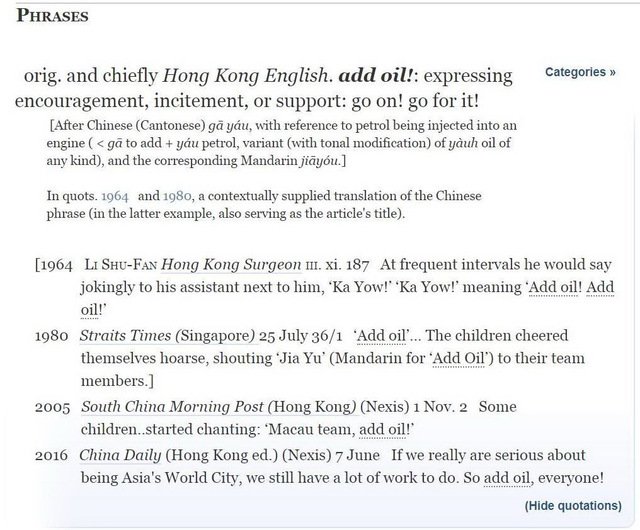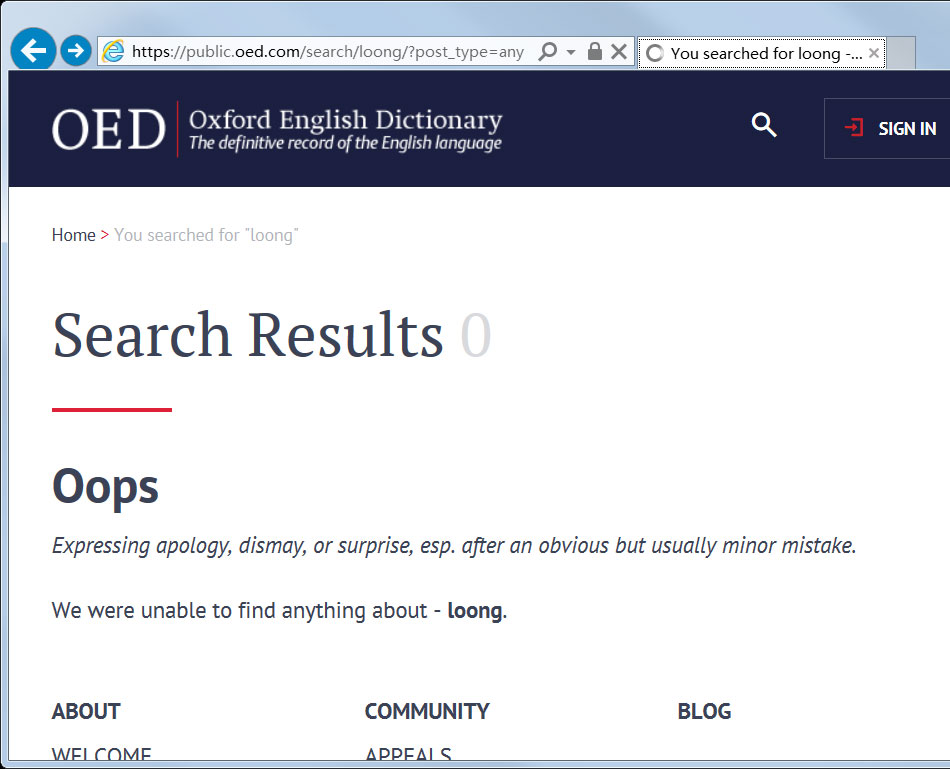

返回首页 《译龙风云——文化负载词的翻译:争议及研究》全文免费下载 |

|
“加油”英语怎么说?七个“加油”的英语说法 angryeditor 的博客,2010-06-14 15:07:55 “加油”有好多英语翻译。用那个合适要看上下文,对方是谁,等等。用错的话,Angry Editor 和其他英语国家的人会被雷得外焦里嫩。 为了避免各种“雷”,Angry Editor罗列了一些不同的“加油”英语翻译: …… 5.“加油”(上述任何情况下,对方是了解中国、汉语的) 大部分在中国或者对中国感兴趣的外国人,不管中文怎么样,知道“加油”这个单词。因此,很多情况下,说“jia you”不会导致误解。 6.“加油”怎么说呢?(上述任何情况下,对方了解中国、汉语的而不是 Angry Editor!) 很多外国人觉得说“add oil”的逐字翻译格外有趣。Angry Editor 倒不觉得。 …… |
|
注:作者是英国人,奥美公关中国的编辑。 (返回顶部) |
|
add oil interjection (expressing encouragement) before 2005 https://public.oed.com/appeals/add-oil-expressing-encouragement/
Add oil is an expression that has gained a lot of currency in Hong Kong in the last few years. A literal translation of the Cantonese phrase ga yao, it is used by Hong Kongers as an exclamation expressing encouragement or support. OED editors are currently researching the term, with an intention to publish in a future update. So far, the earliest definitive evidence we have found is from the South China Morning Post of November 2005:
2005 South China Morning Post (Hong Kong) 1 November (Macau Notes section) p. 2 However, several sources suggest that the expression originated as a cheer at the Macau Grand Prix in the 1960s. Can you help find any printed examples of add oil from before November 2005? Posted by OED_Editor on 17 May 2016 15.00 |

(返回顶部) 黄佶汉译: add oil interjection (expressing encouragement)
before 2005 A 1964 antedating supplied by Bryn has been verified. Add oil is an expression that has gained a lot of currency in Hong Kong
in the last few years. A literal translation of the Cantonese phrase ga
yao, it is used by Hong Kongers as an exclamation expressing encouragement
or support. OED editors are currently researching the term, with an intention
to publish in a future update. So far, the earliest definitive evidence we have found is from the South China Morning Post of November 2005: When a mainland Chinese athlete stepped into the arena, some children mistakenly thought he represented Macau and started chanting: ‘Macau team, add oil!’ 2005 South China Morning Post (Hong Kong) 1 November (Macau Notes section) p.2 (目前,我们发现的最早的确切证据来自 2005年11月的《南华早报》: 当一个来自中国大陆的运动员走进运动场时,一些孩子误以为他是澳门运动员,于是开始呼喊:“澳门队!加油!” 香港《南华早报》澳门通讯版第二页,2005年11月1日。) However, several sources suggest that the expression originated as a cheer at the Macau Grand Prix in the 1960s. Can you help find any printed examples of add oil from before November 2005? (然而,一些线索表明:1960年代澳门格兰披治大赛车时,就出现了这一口号。你能帮我们找到 2005年11月之前任何有关 add oil 的印刷品吗?) Posted by OED_Editor on 17 May 2016 15.00 (牛津英语辞典编辑,贴于 2016年5月17日) (返回顶部) |
The SAR has to 'add oil' if it wants to be a truly multicultural society Updated: 2016-06-07 07:41 By Andrew Mitchell(HK Edition) …… Hong Kong English continues to flourish in post-colonial Hong Kong, with some popular local expressions increasingly used in English rather than the original Cantonese. One example is "add oil", a direct translation of gayau, a term of encouragement meaning keep going. …… In a month when London celebrated its first Muslim mayor and Hong Kong its first Muslim taxi driver, it is all too evident how far we still need to go if we want to be a truly multicultural society. Interestingly the father of Sadiq Khan, the new mayor of London, was a bus driver, so in terms of diversity we can say that Hong Kong is about a generation behind London. This means that if we really are serious about being Asia's World City, we still have a lot of work to do. So add oil, everyone! Andrew Mitchell The author is an educationist, commentator and the director of Oxford Blue, a company providing English language services in Hong Kong. (HK Edition 06/07/2016 page1) |


(返回顶部) |
“加油”不要说“add oil”,会被笑话的! 2017-11-28,华尔街英语 学英文最怕逐字翻译,“加油”就以为是“add oil”,真会把歪果仁弄懵的!下面一起学习正确表达! …… 生活中的这些实用英语,课本上往往都学不到,华尔街英语场景式教学,给你全英文的学习环境,再加上外教指导纠正,帮助你快速提升口语。 (返回顶部) |
From ‘abaca’
to ‘kilig’: World English and the OED ...... In recent years, the OED has undertaken targeted projects to broaden its coverage of several Englishes, publishing particularly large batches of new entries for varieties spoken in Hong Kong, India, Malaysia, the Philippines, Singapore, and South Africa. For each project, we have sought and been grateful to receive extensive expertise from linguists in the region, who have helped us document the varied means by which World English speakers continue to experiment with English vocabulary, using a wide range of strategies apart from simple borrowing in the invention of new words: from the direct translation of an expression in one language to another, as in add oil, a Hong Kong English interjection expressing encouragement, incitement, or support, which is literally translated from the Cantonese expression gā yáu, with reference to petrol being injected into an engine; to the blending of words from different languages, as in the Indian expression chakka jam, the blocking of a road as a form of civilian protest, a combination of Hindi chakka ‘wheel’ with the English word jam; to the creation of new compounds (Indian and Philippine English batchmate, a member of the same graduation class as another), clippings (Singapore English sabo for sabotage), and initialisms (Singapore English HDB, for Housing and Development Board; used to refer to the government-built high-rise apartment blocks most Singaporeans live in). ...... Danica Salazar Published time: September 14/2018 Categories: History of English, Varieties of English Tags: Hong Kong English, hub, Indian English, James Murray, Malaysian
English, OED 90th, OED history, Philippine English, Singapore English,
South African English, World English |

(返回顶部) 黄佶汉译: From ‘abaca’ to ‘kilig’: World English
and the OED ...... In recent years, the OED has undertaken targeted projects to broaden its coverage of several Englishes, publishing particularly large batches of new entries for varieties spoken in Hong Kong, India, Malaysia, the Philippines, Singapore, and South Africa. (近年来,牛津英语辞典启动了几个有针对性的项目,以涵盖数个地区的特色英语,发布了香港、印度、马来西亚、菲律宾、新加坡和南非这些说英语地区的大量新词汇。) For each project, we have sought and been grateful to receive extensive expertise from linguists in the region, who have helped us document the varied means by which World English speakers continue to experiment with English vocabulary, using a wide range of strategies apart from simple borrowing in the invention of new words: (在每一个项目中,我们都寻找并抱着感激的心情接受这些地区的语言学家的广博的专业知识,他们帮助我们记录世界英语的使用者使用英语词汇进行的各种创新,在创造新词汇时,人们不仅直接借用现有的英语词汇,还使用了各种其它方法:) from the direct translation of an expression in one language to another, as in add oil, a Hong Kong English interjection expressing encouragement, incitement, or support, which is literally translated from the Cantonese expression gā yáu, with reference to petrol being injected into an engine; (这些方法包括:把一种语言中的一个表述直接翻译为另一种语言,例如 add oil,这是香港英语中的一个惊叹词,表达鼓励、煽动或支持,它是从广东话“加油”直接翻译过来的,意思是把汽油加入发动机。) to the blending of words from different languages, as in the Indian expression chakka jam, the blocking of a road as a form of civilian protest, a combination of Hindi chakka ‘wheel’ with the English word jam; (另一种方法是把不同语言的词汇混合在一起,例如印度人说的 chakka jam,是把印度语 chakka(轮子)和英语单词 jam 混合而成的,表示民众举行抗议活动时堵塞道路的行为。) to the creation of new compounds (Indian and Philippine English batchmate, a member of the same graduation class as another), clippings (Singapore English sabo for sabotage), and initialisms (Singapore English HDB, for Housing and Development Board; used to refer to the government-built high-rise apartment blocks most Singaporeans live in). (还有一些其它方法:创造新的复合词(印度和菲律宾英语中的 batchmate:同一年毕业的校友),剪切(sabotage 在新加坡英语里被简化为 sabo),用首字母构成新词(新加坡英语 HDB 由 Housing and Development Board(住房和发展委员会)的首字母构成,用来指大多数新加坡人居住的、由政府建造的高层公寓楼)。 ...... Danica Salazar (返回顶部) |
中文“加油”进牛津词典 曾泰元,2018年10年10日,南方周末 加油!Add oil! 这个直译自中文的英文词语,最近竟然悄无声息地就溜进英文词典,我偶然发现时大感诧异。这么些年来我密切关注英文里收录的中国元素,想不到这个新成员居然让我给疏忽了, 成了漏网之鱼。 2008年北京奥运时,英文媒体上 jiayou(加油)用得很多,那时某些人士留意到了,觉得这个中文词语很有可能会进入英文,许多吃瓜群众似乎也都兴致勃勃,屏息以待。 每次《牛津英语词典》(Oxford English Dictionary,简称 OED)做季度更新、发布新词新义之时,我都会从头到尾仔细浏览一遍官网的新词表,看看 jiayou 收进去了没有,并检查一下有没有其他的中国元素。中国元素偶尔会现身,2016年3月的第一季更是硕果累累,然而这个 jiayou 却一直音讯杳然。于是有时我闲来没事,就会登录 OED 的官网,键入 jiayou,看看会不会有意外的惊喜。 2018年10月8日星期一,我趁着东吴大学英文系上课前的空档,在 OED 的搜索框里键入 jiayou。页面同以往一样,跳出一排醒目的红字,说 No dictionary entries found for 'jiayou'(词典里找不到 jiayou 的条目),可是这个结果页面的最后一行似乎有了些异样。原来应该是“0”的数字居然出现了“1”,说在定义、词源、全文都各有一笔 jiayou 的记录。 我点进去一看,原来 jiayou 是出现在“add oil!”这个感叹词短语里,这下豁然开朗了!音译没收,却收了个直译的加(add)油(oil)! |

|
OED 解释道,这个“add oil!”源自香港英语,主要也是香港英语的说法(originally and chiefly Hong Kong English),用以表达鼓励、煽动、或支持(expressing encouragement, incitement, or support),相当于英文的“go on!”或“go for it!” OED 在词源里追根究底,说这个短语译自粤语的 gā yáu,对什么是 gā,什么是 yáu,OED 继续说文解字了一番,并点出粤语的 gā yáu 相当于国语的 jiāyóu。 看到这里,我想到了我大学本科念台大外文系时的一段经历。“加油”的英文那时我不会讲,便把它逐字翻译为“add oil”,自己也知道这是中式英语,不过轻松的场合以此搞笑一下,大家也都莞尔以对。这个翻译的问题,我还问了同班同学高怡平(后来成为台湾知名的电视综艺节目主持人),她在美国读过书,英文的口语十分地道,跟我说用“Go!”就可以了,强调时可以连讲三次,说“Go! Go! Go!”。 把“加油”直译为“add oil”,看来是英雄所见略同啊!而如今,居然最权威的 OED 也收了。 OED 收了4条“add oil!”的书证,时间最近的一条出现于 2016年6月7日,引用的媒体是 China Daily(中国日报)的香港版,作者是英国驻港的教育学者 Andrew Mitchell(安德鲁?米切尔): If we really are serious about being Asia's World City, we still have a lot of work to do. So add oil, everyone!(要成为亚洲的世界级城市,如果我们真的是认真的话,那么我们还有很多事要做。所以各位,加油!) 这条 2016年6月7日的书证可以说明,“add oil!”最早有可能出现在 2016年6月下旬的第二季更新。然而这似乎不太可能,之后其他的时间点我也存疑,因为我时不时就会登录 OED 的官网,搜索 jiayou 的动态,却一直没有发现这个改变,直到 2018年10月8日。因此我推测,“add oil!”极有可能是 2018年第三季加入 OED 的,这一季的更新本当于 9月下旬公布,因故推迟到 10月3日。 2018年10月3日公布的年度第三季更新,我只注意到了 Chan(禅;禅宗)和 bihon(米粉,闽南语)这两个新增的中国元素,却遗漏了“add oil!”(加油)。短语的特性不同于一般的词语,因此搜索时经常难以通过常规的办法察觉。 就在我发现“add oil!”的同一天,南京大学双语词典研究中心的主任魏向清教授恰巧给我发来微信,问我有没有 OED 里中文词汇的完整清单。我说我十几年前做过一个 OED 简编版的,还没有正式做过 OED 完整版的,最近几年只新增了一些零零星星的数据。我承诺要抽空好好爬梳一下 OED,把里面的中国元素尽可能地统计整理出来,届时再把结果给她参考。 看来,我是真的得好好加油了。Add oil! (作者是东吴大学英文系副教授、原系主任,国家语委汉语辞书研究中心兼职研究员) (返回顶部) |
【编后记】 不少人在疑惑,为什么收入的不是 jiayou 这一音译,而是 add oil 这一意译? 我猜测是这样的:add oil 的字母和 jiayou 一样多,音节没有增加很多,但是比 jiayou 容易理解得多,所以权衡下来选择前者。这符合翻译经济学规律。关于“翻译经济学”的详细论述,可见《译龙风云》第九章 9-2,翻译经济学:语言的翻译也讲究“性价比”,点击此链接可以免费下载。 Loong(龙)仍然没有被 OED 收入,赞同改译龙的朋友们任重道远! |

黄佶,2018年10月19日 (返回顶部) |
返回首页 《译龙风云——文化负载词的翻译:争议及研究》全文免费下载 |